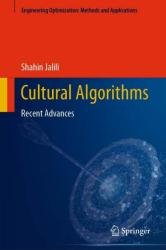Cultural Algorithms: Recent Advances
- Добавил: literator
- Дата: 26-11-2022, 15:59
- Комментариев: 0
 Название: Cultural Algorithms: Recent Advances
Название: Cultural Algorithms: Recent AdvancesАвтор: Shahin Jalili
Издательство: Springer
Год: 2022
Страниц: 277
Язык: английский
Формат: pdf (true), epub
Размер: 39.7 MB
This book covers the latest advances in Cultural Algorithms, their general framework, different variants, hybridized versions with other meta-heuristic and search techniques, and their applications. Cultural Algorithms (CAs) are meta-heuristic numerical optimization techniques inspired by the bio-cultural evolutionary theory, in which both types of vertical and horizontal learning behaviors are modeled. The book includes well-briefed basics of optimization and theoretical backgrounds of Cultural Algorithms in its initial chapters and then discusses their applications in different branches of science and engineering. It provides detailed mathematical formulations and algorithmic pseudo-codes of hybridized, extended, and multi-population variants of cultural algorithms. The book will serve the research students, fellows, professors, and industry professionals to implement real-time applications of Cultural Algorithms.
According to the biocultural evolutionary theory, genes and culture are two interacting forms of inheritance and overall human evolution can be viewed as the product of the changes in biological and cultural traits. Both genetic and cultural evolutionary processes include a form of information transmission. In genetic evolution, the genetic information embedded within the genes is being vertically transmitted from parents to offspring. In cultural evolution, the cultural variants such as beliefs, habits, skills, traditions, and preferences, pass from one generation to the next and they can be changed or even replaced by new ones over time due to changes in the cultural environment. In comparison to genetic evolution, the information transmission in cultural evolution is a much more complicated process. The information flow in cultural evolution includes both vertical and horizontal transmissions in which the cultural information is not only vertically inherited from parents to offspring, but also offspring have the opportunity to socially learn and acquire information from other members of the society.
CAs have some characteristic features that make them unique in comparison to other evolutionary algorithms (EAs). They model the biocultural evolutionary theory to perform the search process for global optima, in which both types of vertical and horizontal learning behaviours of individuals are modelled. Since their emergence, CAs have been extended and successfully employed to solve a wide variety of problems in different branches of science and technology.
The main aim of this book is to explore the recent advances in the algorithmic framework of CAs and their applications to the different problems in the literature. While the main approach of the book is to briefly discuss and explain the application studies and algorithmic details of CAs, the detailed mathematical formulations and algorithmic pseudo-codes are also discussed in each chapter to provide a clear explanations for the different concepts. The book is mainly aimed at postgraduate students and researchers in computer science and engineering subjects with research interests in optimisation and meta-heuristic algorithms. Throughout the book, it is assumed that the readers are familiar with the basic concepts of optimisation theory and meta-heuristic algorithms. However, the author tried to provide relevant references in each chapter to assist the readers in understanding the contents of the book.
The emergence of meta-heuristic algorithms goes back to the 1960s, when Holland and his fellow researchers at the University of Michigan developed Genetic Algorithms (GAs) based on the principle of natural selection in Darwin’s evolutionary theory of biological species. Following the successful application of GAs, a significant number of new meta-heuristics inspired by different phenomena in nature have been developed, such as Simulated Annealing (SA), Tabu Search (TS), Ant Colony Optimisation (ACO), Differential Evolution (DE), Particle Swarm Optimisation (PSO), Harmony Search (HS), Biogeography-based Optimisation (BBO), and Teaching–Learning-Based Optimisation (TLBO). Meta-heuristics can be categorised based on their sources of inspiration.
The book comprises nine different chapters divided into three parts. Part I contains the basic concepts of standard CAs and their theoretical background. The first part explains how the basic concepts in biocultural evolutionary theory have been employed to develop standard CAs. Part II discusses the applications of CAs to a wide range of real-world problems and presents their detailed mathematical formulations, including decision variables, objective functions, and constraints. Part III investigates the different variants of CAs developed in literature and their algorithmic details. The third part includes a comprehensive survey and detailed pseudo-codes of different extended, hybrid, and multi-population versions of CAs. The last chapter of the book presents the application study of CAs to the real-world structural optimisation problems.
Скачать Cultural Algorithms: Recent Advances
Внимание
Уважаемый посетитель, Вы зашли на сайт как незарегистрированный пользователь.
Мы рекомендуем Вам зарегистрироваться либо войти на сайт под своим именем.
Уважаемый посетитель, Вы зашли на сайт как незарегистрированный пользователь.
Мы рекомендуем Вам зарегистрироваться либо войти на сайт под своим именем.
Информация
Посетители, находящиеся в группе Гости, не могут оставлять комментарии к данной публикации.
Посетители, находящиеся в группе Гости, не могут оставлять комментарии к данной публикации.
